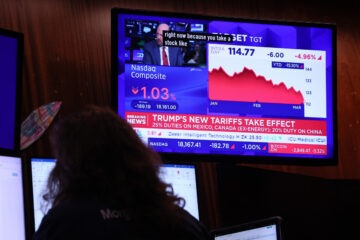Intel CEO Pat Gelsinger sees ‘unprecedented’ global demand for chips in the coming year, but notes that supply chain constraints will continue into early 2023.
Intel (INTC) – Get Intel Corporation Report shares slumped lower Thursday after the chipmaker cautioned that supply chain disruptions would keep a lid on near-term profits growth, clouding the impact of its record fourth quarter revenue haul.
Intel said March quarter earnings would come in around 80 cents per share, around 6 cents shy of the Refinitiv forecast, after posting record revenues of $19.53 billion and an adjusted bottom line of $1.09 per share over the three months ending in December, both of which handily topped Street consensus forecasts.
Intel said client computing group sales fell 7% to $10.1 billion, but that was partly offset by a 20% jump in data center revenues, which hit $7.3 billion. Cloud revenues, which sit in the data center business, were also lower on the year, but the rate of decline was much less severe than in previous quarters.
Tesla, Apple, Intel, Netflix and Markets – Five Things You Must Know
“In Q4, we also saw the strong recovery in the channel as increased supply led to a record sell-through for Intel, and we started to see inventories return to pre-pandemic levels,” CEO Pat Gelsinger told investors on a conference call late Wednesday. “Unprecedented demand continues to be tempered by supply chain constraints as shortages in substrates, components, and foundry silicon has limited our customers’ ability to ship finished systems.”
Intel shares were marked 2.9% lower in pre-market trading to indicate an opening bell price of $50.20 each.
“While results and guidance were largely within expectations, guidance is slightly lower on EPS,” said BMO Capital Markets analyst Ambrish Srivastava, who is holding his ‘market perform’ rating with a $52.00 price target on the stock ahead of Intel’s February investor day.
“Reported results were better, and the upside came from both the (computing) and the (date center) segments, both meaningfully better than our estimate. While (data center) performed markedly better, the continuing year-on-year decline in the Cloud revenues jumps out as an incremental negative.”
Last week, unveiled plans to invest $20 billion into two chipmaking plants in Ohio that it hopes have have up-and-running within three years as it expands domestic production amid concerns from the U.S. government over dearth of domestic chip supplies.
Intel, which detailed a similar investment in Arizona last March, said the Ohio investment will create 3,000 jobs — with another 7,000 needed to build the two plants — and expand the group’s plans to take-on rivals such as Samsung and Taiwan Semi TSMC in the global semiconductor market.
The plans also dovetail with President Joe Biden’s ambitions for a $52 billion bill that would help U.S. chipmakers expand domestic production levels and reduce their dependence on overseas markets for crucial components in the nation’s industrial and tech supply chain.


